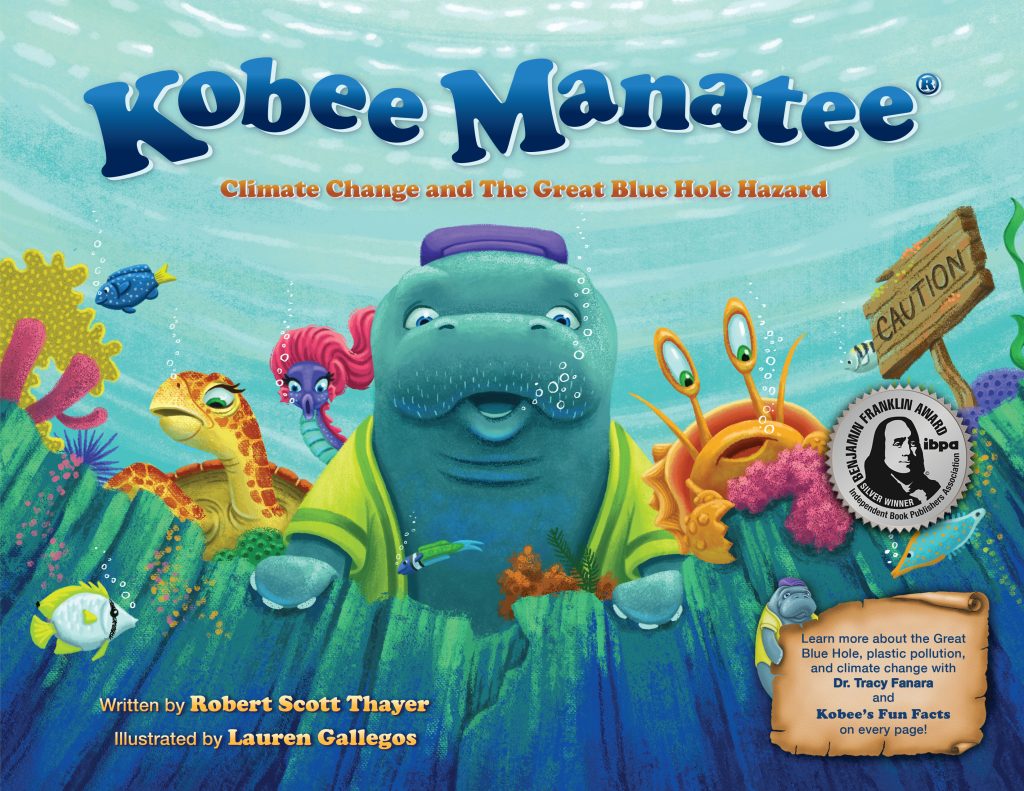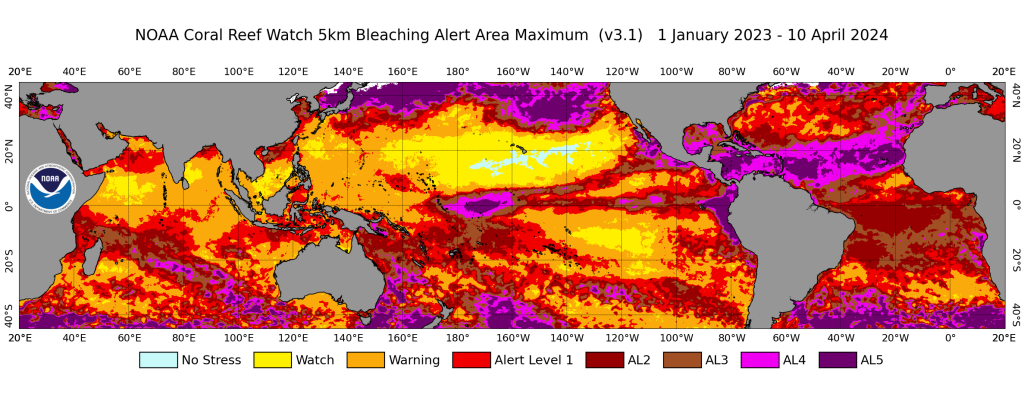NOAA Confirms Major Global Bleaching Event due to Climate Change
Greetings to you! Unfortunately, I have breaking news on our oceans heating up from climate change. NOAA just reported that bleaching-level heat stress, which is monitored by the Coral Reef Watch (CRW) “continues to be extensive across the Atlantic, Pacific and Indian Ocean basins. This is the fourth global event on record and the second in the last 10 years.”
Dr. Derek Manzello, NOAA CRW coordinator said, “From February 2023 to April 2024, significant coral bleaching has been documented in both the Northern and Southern Hemispheres of each major ocean basin.”
NOAA adds, “Since early 2023, mass bleaching of coral reefs has been confirmed throughout the tropics, including in Florida in the U.S.; the Caribbean; Brazil; the eastern Tropical Pacific (including Mexico, El Salvador, Costa Rica, Panama and Colombia); Australia’s Great Barrier Reef; large areas of the South Pacific (including Fiji, Vanuatu, Tuvalu, Kiribati, the Samoas and French Polynesia); the Red Sea (including the Gulf of Aqaba); the Persian Gulf; and the Gulf of Aden.”
NOAA has also confirmed and reported, “… widespread bleaching across other parts of the Indian Ocean basin as well, including in Tanzania, Kenya, Mauritius, the Seychelles, Tromelin, Mayotte and off the western coast of Indonesia.”
Dr. Manzello added, “As the world’s oceans continue to warm, coral bleaching is becoming more frequent and severe. When these events are sufficiently severe or prolonged, they can cause coral mortality, which hurts the people who depend on the coral reefs for their livelihoods.”
The bad news: When coral bleaching happens globally and on such a widespread scale its effects are felt in food shortages, economies and livelihoods.
The good news: Coral bleaching can be reversed if the stressors causing the bleaching can be reduced and mitigated. The corals can recover and their ecosystem can again contribute to a balance for both man and nature.
Jennifer Koss, Director of NOAA’s Coral Reef Conservation Program (CRCP) said, “Climate model predictions for coral reefs have been suggesting for years that bleaching impacts would increase in frequency and magnitude as the ocean warms. We are on the frontlines of coral reef research, management and restoration, and are actively and aggressively implementing the recommendations of the 2019 Interventions Report.”
“The 2023 heatwave in Florida was unprecedented. It started earlier, lasted longer and was more severe than any previous event in that region. During the bleaching event, NOAA learned a great deal while engaging in interventions to mitigate harm to corals. NOAA made significant strides to offset some of the negative impacts of global climate change and local stressors on Florida’s corals, including moving coral nurseries to deeper, cooler waters and deploying sunshades to protect corals in other areas.”
This newest global event needs immediate global action. The International Coral Reef Initiative (ICRI), which NOAA co-chairs are sharing and applying resilience-based management actions and lessons learned from the 2023 marine heatwaves in Florida and the Caribbean.
The Coral Reef Conservation Program is a partnership where several NOAA offices bring together expertise for a better understanding the conservation of coral reef ecosystems.
Introducing an Excellent Way to Talk to Kids with “Soft Facts” about Climate Change
One awesome tool for talking to kids about climate change is to read my fourth installment in the award-winning Kobee Manatee® Children’s Educational Picture Book series. It’s titled, Kobee Manatee® Climate Change and The Great Blue Hole Hazard. It’s about climate change and plastic pollution in our oceans.

When you read this award-winning educational picture book to children, you’ll discover it’s a fun and fictional adventure loaded with weaved in facts on climate change and plastic pollution. This helps children learn about this serious subject in a fun and entertaining way. Here’s a brief synopsis …
Kobee Manatee®, the protagonist and his seafaring pals, Tess the seahorse and Pablo the hermit crab swim from the Cayman Islands to Belize. Kobee wants to help his cousin Quinn clean up plastic litter at her new, all-veggie underwater bistro called Quinn’s Seagrass Café.
On their Caribbean journey they encounter harmful effects of climate change and plastic pollution. As if that wasn’t enough, several other unforeseen problems occur with a distressed loggerhead turtle, a giant Portuguese man-of-war, and a venomous scorpionfish. They’re all amazed when they discover the extraordinary Great Blue Hole. Then their adventure takes another crazy turn when Pablo plunges into its huge abyss!
Each page includes in-depth, scientific details on climate change and plastic pollution in our oceans with Dr. Tracy Fanara, NOAA Scientist (aka Inspector Planet). Tracy can be seen on The Weather Channel as a visiting expert and she’s also seen on their “Weird Earth” segments.
We already have Fantastic Reviews on our Newest Release!
“A well-crafted, thoughtful, and well-illustrated addition to a noteworthy educational book series.” —Kirkus Reviews
“Robert Scott Thayer presents an important environmental message in an engaging story with wonderful characters. Anyone who loves the ocean and wants to help save it should read Kobee Manatee: Climate Change and The Great Blue Hole Hazard. I’m looking forward to the next Kobee Manatee adventure.” —Readers’ Favorite
For young readers who enjoy imaginative tales surrounding affable and heroic sea creatures, as well as parents and/or teachers looking for a way to introduce youngsters to the importance of marine conservation, Kobee Manatee® Climate Change and The Great Blue Hole Hazard offers a perfect blend. Highly recommended! – Chanticleer Book Reviews
If you see any sick or injured manatees, please call the Florida Fish and Wildlife Conservation Commission at: 1-888-404-3922 (FWCC). They are the folks who are responsible for rescuing us in Florida.
Here’s the Save the Manatee Club link to learn more about manatees …
Here’s a cool link for you to learn more about how manatees are rescued and brought into rehabilitation …
~ Robert Scott Thayer
Related Posts
